
EBIXA 5 mg/puff ORAL SOLUTION
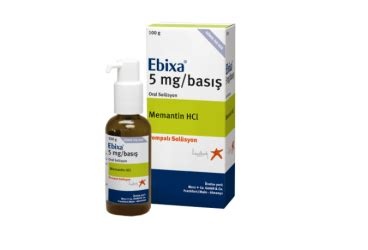

How to use EBIXA 5 mg/puff ORAL SOLUTION
Translated with AI
This page provides general information and does not replace a doctor’s consultation. Always consult a doctor before taking any medication. Seek urgent medical care if symptoms are severe.
Show originalContents of the leaflet
Introduction
PACKAGE LEAFLET: INFORMATION FOR THE USER
Ebixa 5 mg/pulse, oral solution
Memantine hydrochloride
Read all of this leaflet carefully before you start taking this medicine because it contains important information for you.
- Keep this leaflet, you may need to read it again.
- If you have any further questions, ask your doctor or pharmacist.
- This medicine has been prescribed for you only. Do not pass it on to others. It may harm them, even if their signs of illness are the same as yours.
- If you get any side effects, talk to your doctor or pharmacist. This includes any possible side effects not listed in this leaflet. See section 4.
Contents of the pack
- What Ebixa is and what it is used for
- What you need to know before you take Ebixa
- How to take Ebixa
- Possible side effects
- Storage of Ebixa
- Contents of the pack and other information
1. What Ebixa is and what it is used for
Ebixa contains the active substance memantine hydrochloride. It belongs to a group of medicines called anti-dementia medicines.
Memory loss in Alzheimer's disease is due to a disturbance of message signals in the brain. The brain contains so-called N-methyl-D-aspartate (NMDA) receptors that are involved in the transmission of nerve signals that are important for learning and memory. Ebixa belongs to a group of medicines called NMDA receptor antagonists. Ebixa acts on these receptors, improving the transmission of nerve signals and memory.
Ebixa is used in the treatment of patients with moderate to severe Alzheimer's disease.
2. What you need to know before you take Ebixa
Do not take Ebixa
if you are allergic to memantine or any of the other ingredients of this medicine (listed in section 6).
Warnings and precautions
Consult your doctor or pharmacist before taking Ebixa:
- if you have a history of epileptic seizures.
- if you have recently suffered a myocardial infarction (heart attack), if you suffer from congestive heart failure or if you have uncontrolled hypertension (high blood pressure).
In these situations, treatment should be carefully supervised and your doctor should regularly re-evaluate the clinical benefit of Ebixa.
If you have renal impairment (kidney problems), your doctor should closely monitor your kidney function and, if necessary, adjust the dose of memantine.
If you have renal tubular acidosis (RTA, excess of acid-producing substances in the blood due to kidney dysfunction) or severe urinary tract infections (urinary tract), your doctor may need to adjust the dose of the medicine.
The use of memantine should be avoided with other medicines such as amantadine (for the treatment of Parkinson's disease), ketamine (a medicine generally used as an anesthetic), dextromethorphan (a medicine for treating cough) and other NMDA antagonists.
Children and adolescents
The use of Ebixa is not recommended in children and adolescents under 18 years of age.
Taking Ebixa with other medicines
Tell your doctor or pharmacist if you are using or have recently used or may need to use any other medicines.
In particular, the administration of Ebixa may produce changes in the effects of the following medicines, so your doctor may need to adjust the dose:
- amantadine, ketamine, dextromethorphan,
- dantrolene, baclofen,
- cimetidine, ranitidine, procainamide, quinidine, quinine, nicotine,
- hydrochlorothiazide (or any combination with hydrochlorothiazide),
- anticholinergics (substances generally used to treat movement disorders or intestinal spasms),
- anticonvulsants (substances used to prevent and eliminate convulsions),
- barbiturates (substances generally used to induce sleep),
- dopaminergic agonists (substances such as L-dopa, bromocriptine),
- neuroleptics (substances used in the treatment of mental illnesses),
- oral anticoagulants.
If you are hospitalized, inform your doctor that you are taking Ebixa.
Taking Ebixa with food and drinks
You should inform your doctor if you have recently changed or plan to change your diet substantially (e.g., from a normal diet to a strict vegetarian diet), as your doctor may need to adjust the dose of the medicine.
Pregnancy and breastfeeding
If you are pregnant or breastfeeding, think you may be pregnant or plan to become pregnant, consult your doctor or pharmacist before using this medicine.
Pregnancy:The use of memantine is not recommended in pregnant women.
Breastfeeding:Women taking Ebixa should not breastfeed.
Driving and using machines
Your doctor will inform you if your illness allows you to drive and use machines safely.
Also, Ebixa may alter your reaction ability, so driving or operating machinery may be inappropriate.
Ebixa contains sorbitol
This medicine contains sorbitol. If your doctor has told you that you have an intolerance to some sugars, consult with them before taking this medicine. Your doctor will advise you on the most suitable course of action.
Additionally, this medicine contains potassium, less than 1 mmol (39 mg) per dose, i.e., essentially potassium-free.
3. How to take Ebixa
Follow exactly the administration instructions of this medicine indicated by your doctor. In case of doubt, consult your doctor or pharmacist again.
One pulse contains 5 mg of memantine hydrochloride.
The recommended dose of Ebixa in adult and elderly patients is four pulses, equivalent to 20 mg administered once a day. To reduce the risk of side effects, this dose is gradually achieved following the following daily scheme:
week 1 | one pulse |
week 2 | two pulses |
week 3 | three pulses |
week 4 and subsequent | four pulses |
The usual starting dose is one pulse once a day (1 x 5 mg) the first week. This dose is increased in the second week to two pulses once a day (1 x 10 mg) and in the third week to three pulses once a day (1 x 15 mg). From the fourth week, the recommended dose is four pulses once a day (1 x 20 mg).
Dosage for patients with reduced renal function
If you have reduced renal function, your doctor will decide the appropriate dose for your condition. In this case, your doctor should periodically monitor your kidney function.
Administration
Ebixa should be administered orally once a day. To get the most out of your medication, you should take it every day and at the same time. The solution should be taken with a little water. The solution can be taken with or without food.
For detailed instructions on the preparation and handling of the product, see the end of this leaflet.
Duration of treatment
Continue taking Ebixa as long as it benefits you. Your doctor should periodically evaluate your treatment.
If you take more Ebixa than you should
- Generally, taking an excessive amount of Ebixa should not cause you any harm. You may experience an increase in the symptoms described in section 4 "Possible side effects".
- If you take an overdose of Ebixa, contact your doctor or seek medical advice, as you may need medical attention.
If you forget to take Ebixa
- If you realize you have forgotten to take your dose of Ebixa, wait and take the next dose at the usual time.
- Do not take a double dose to make up for the forgotten dose.
If you have any other questions about the use of this medicine, ask your doctor or pharmacist.
4. Possible side effects
Like all medicines, this medicine can cause side effects, although not everybody gets them.
In general, side effects are classified from mild to moderate.
Frequent (affects 1 to 10 users in 100):
- Headache, drowsiness, constipation, elevated liver function tests, dizziness, balance disorder, difficult breathing, high blood pressure, and hypersensitivity to the medicine.
Uncommon (affects 1 to 10 users in 1,000):
- Fatigue, fungal infections, confusion, hallucinations, vomiting, gait disturbance, heart failure, and venous thrombosis/thromboembolism.
Rare (affects less than 1 user in 10,000):
- Seizures.
Frequency not known (frequency cannot be estimated from the available data):
- Pancreatitis, liver inflammation (hepatitis), and psychotic reactions.
Alzheimer's disease has been associated with depression, suicidal ideation, and suicide. These events have been reported in patients treated with Ebixa.
Reporting of side effects
If you experience any side effects, talk to your doctor or pharmacist. This includes any possible side effects not listed in this leaflet. You can also report side effects directly through the national reporting system included in Annex V. By reporting side effects, you can help provide more information on the safety of this medicine.
5. Storage of Ebixa
Keep this medicine out of the sight and reach of children.
Do not use this medicine after the expiry date which is stated on the carton and label of the bottle after EXP. The expiry date is the last day of the month stated.
Do not store above 30°C.
Once opened, the contents of the bottle should be used within 3 months.
The bottle with the doser attached should be stored and transported only in a vertical position.
Medicines should not be disposed of via wastewater or household waste. Ask your pharmacist how to dispose of medicines no longer required. This will help protect the environment.
6. Contents of the pack and other information
Composition of Ebixa
-The active substance is memantine hydrochloride. Each pulse of the doser releases 0.5 ml of solution containing 5 mg of memantine hydrochloride, equivalent to 4.16 mg of memantine.
-The other ingredients are potassium sorbate, sorbitol E420, and purified water.
Appearance of the product and pack contents
Ebixa, oral solution, is a clear, colorless to slightly yellowish solution.
Ebixa, oral solution, is available in bottles of 50 ml, 100 ml, or 10 x 50 ml.
Not all pack sizes may be marketed.
Marketing authorization holder and manufacturer
- Lundbeck A/S
Ottiliavej, 9
2500 Valby
Denmark
You can obtain more information on this medicine by contacting the local representative of the marketing authorization holder.
Belgium/België/Belgien Lundbeck S.A./N.V. Tel: +32 2 535 7979 | Lithuania
Tel: +45 36301311 |
Bulgaria Lundbeck Export A/S Representative Office Tel: +359 2 962 4696 | Luxembourg/Luxemburg Lundbeck S.A. Tel: +32 2 340 2828 |
Czech Republic Lundbeck Ceská republika s.r.o. Tel: +420 225 275 600 | Hungary Lundbeck Hungaria Kft. Tel: +36 1 4369980 |
Denmark Lundbeck Pharma A/S Tel: +45 4371 4270 | Malta
Tel: +45 36301311 |
Germany Lundbeck GmbH Tel: +49 40 23649 0 | Netherlands Lundbeck B.V. Tel: +31 20 697 1901 |
Estonia
Tel: +45 36301311 | Norway
Tel: +47 91 300 800 |
Greece Lundbeck Hellas S.A. Tel: +30 210 610 5036 | Austria Lundbeck Austria GmbH Tel: +43 1 266 9108 |
Spain Lundbeck España S.A. Tel: +34 93 494 9620 | Poland Lundbeck Poland Sp. z o. o. Tel: +48 22 626 93 00 |
France Lundbeck SAS Tel: +33 1 79 41 29 00 | Portugal Lundbeck Portugal Lda Tel: +351 21 00 45 900 |
Croatia Lundbeck Croatia d.o.o. Tel: +385 1 6448263 | Romania Lundbeck Export A/S Tel: +40 21319 88 26 |
Ireland Lundbeck (Ireland) Limited Tel: +353 1 468 9800 | Slovenia Lundbeck Pharma d.o.o. Tel: +386 2 229 4500 |
Iceland Vistor hf. Tel: +354 535 7000 | Slovakia Lundbeck Slovensko s.r.o. Tel: +421 2 5341 42 18 |
Italy Lundbeck Italia S.p.A. Tel: +39 02 677 4171 | Finland Oy H. Lundbeck Ab Tel: +358 2 276 5000 |
Cyprus Lundbeck Hellas A.E Tel: +357 22490305 | Sweden
Tel: +46 4069 98200 |
Latvia
Tel: +45 36301311 | United Kingdom Lundbeck Limited Tel: +44 1908 64 9966 |
Date of last revision of this leaflet:(MM/YYYY)
Detailed information on this medicine is available on the European Medicines Agency website: http://www.ema.europa.eu.
Instructions for the correct use of the doser
The solution should not be poured or dispensed directly into the mouth from the bottle or doser. Measure the dose in a spoon or in a glass of water using the doser.
Remove the screw cap from the bottle:
The cap should be turned counterclockwise, completely unscrewed, and removed (fig.1).
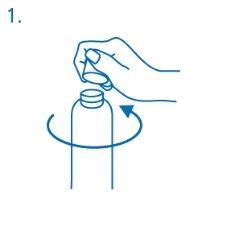
Attach the doser to the bottle:
Remove the doser from the plastic bag (fig.2) and place it on top of the bottle. Carefully insert the plastic tube into the bottle. Keep the doser on the neck of the bottle and turn it clockwise until it is firmly attached (fig.3). The doser should only be screwed on once when starting use and never unscrewed.
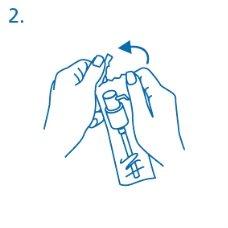
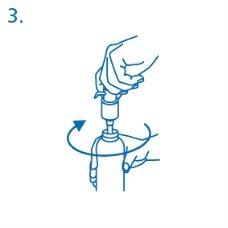
How the doser works:
The doser head has two positions and turns easily
-counterclockwise to open
-clockwise to close
The doser head should not be pressed down while it is in the closed position. The solution can only be dispensed in the open position. To open, turn the doser head in the direction indicated by the arrow until it cannot be turned further (about one-eighth of a turn, fig.4). The doser is then ready for use.
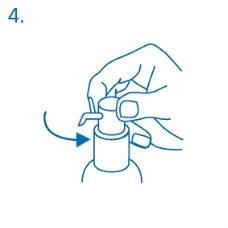
Prepare the doser:
When used for the first time, the doser does not dispense the correct amount of oral solution. Therefore, it must be prepared (primed) by pressing the doser head down completely five times in a row (fig.5).
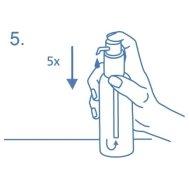
The solution thus dispensed should be discarded. The next time the doser head is pressed down completely (equivalent to one pulse), it already dispenses the correct dose (fig.6).
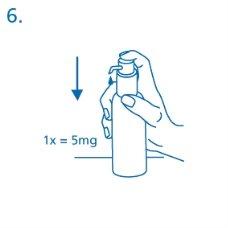
Correct use of the doser:
Place the bottle on a flat surface, horizontally, for example on a table, and it should only be used in a vertical position. Place a glass with a little water or a spoon under the spout. Press the doser head down firmly but calmly and steadily, not too slowly (fig.7, fig.8).
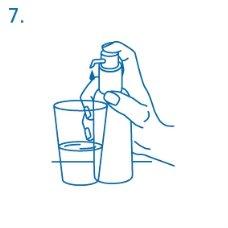
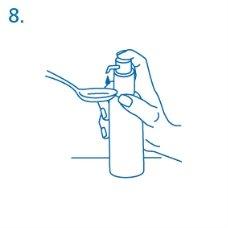
The doser head can then be released and is ready for the next pulse.
The doser should only be used with the Ebixa solution in the provided bottle, not for other products or containers. If the doser does not work correctly, consult your doctor or pharmacist. Close the doser after using Ebixa.
- Country of registration
- Active substance
- Prescription requiredYes
- Manufacturer
- This information is for reference only and does not constitute medical advice. Always consult a doctor before taking any medication. Oladoctor is not responsible for medical decisions based on this content.
- Alternatives to EBIXA 5 mg/puff ORAL SOLUTIONDosage form: TABLET, 10 mgActive substance: memantineManufacturer: Merz Pharmaceuticals GmbhPrescription requiredDosage form: TABLET, 10 mgActive substance: memantineManufacturer: Merz Pharmaceuticals GmbhPrescription requiredDosage form: TABLET, 20 mgActive substance: memantineManufacturer: Merz Pharmaceuticals GmbhPrescription required
Online doctors for EBIXA 5 mg/puff ORAL SOLUTION
Discuss questions about EBIXA 5 mg/puff ORAL SOLUTION, including use, safety considerations and prescription review, subject to medical assessment and local regulations.
Frequently Asked Questions














